Saturday, May 13, 2006
Pennsylvania: Corrupt and malcontented
RANTER'S NOTE: Tuesday is election day in Pennsylvania. To better prepare you for pushing the electronic buttons in a new-fangled voting booth, I've decided to look at an issue each day that you might want to factor into your decisions.
"Pennsylvania is one of only a handful of states without any meaningful campaign finance reforms. The state has no contribution limits, no spending limits, and no provisions for public financing of campaigns. Yet all three are important components of any real effort to return control of the political process to the people. ... If Pennsylvania is going to take action to clean up its election process, and the legislative process that results, it needs to take that action now."
 State Rep. Greg Vitali, one of the leading legislators to call for reform, wrote those words more than five years ago.
State Rep. Greg Vitali, one of the leading legislators to call for reform, wrote those words more than five years ago.He then embarrassed Pennsylvania legislative leaders by posting the first Web site to detail campaign contributions for statewide candidates.
Vitali took down his site last year after the state finally posted its own campaign finances and contributions Web sites. But nothing else has changed.
Pennsylvania still has no limits on what someone can contribute to a political campaign or how much can be spent.
Vitali, a Delaware County Democrat, repeatedly tried to get public financing for this year's gubernatorial campaign through a voluntary $5 checkoff on the state's Personal Income Tax form and a General Fund budget appropriation.
But his bill never made it out of committee and he has not reintroduced it so far during this two-year legislative session. Instead, Vitali has been focusing on lobbying reform, a call that House Speaker John Perzel resisted until after last year's legislative pay raise was repealed.
There are currently nearly 100 bills pending in the Legislature dealing with election law and campaigns. Yet, none of them calls for the type of sweeping reforms Vitali demanded half a decade ago.
Some would actually loosen the few restrictions politicians do face in Pennsylvania, including letting civil service workers take active parts in campaigns, and letting candidates file their required statements of financial interests after the last day for filing a petition.
Only one bill, S.B. 1094, calls for public financing. It's strictly an experiment focusing on Common Pleas Court and municipal judge races in Philadelphia.
The bill calls for the formation of a matching fund, fueled by a $10 checkoff on state income taxes and backed up by other state taxes, that "major political party" candidates for judge could qualify.
 If a candidate opts in - it's not mandatory - the fund would match the candidate dollar-for-dollar up to $100,000 if they have raised at least $7,500 in the primary or $15,000 in the general election. No contribution could be more than $500, except for th candidate and his immediate family, who can contribute up to $10,000 each.
If a candidate opts in - it's not mandatory - the fund would match the candidate dollar-for-dollar up to $100,000 if they have raised at least $7,500 in the primary or $15,000 in the general election. No contribution could be more than $500, except for th candidate and his immediate family, who can contribute up to $10,000 each.Those who accept public funding would be limited to spending $200,000 total. Anyone who violates those rules could be convicted of a misdemeanor and face up to five years in jail and a fine of $10,000 or three times the amount of money misused.
The bill, which was authored by state Senators Anthony Williams, Shirley Kitchen, Vince Fumo and Constance Williams, was referred to the Senate's state government committee on March 16.
New Jersey tried a similar experiment last year with candidates for its state Assembly in two of its 40 districts.
Ten Assembly candidates participated. They were eligible for up to $130,000 in state funds if they raised $20,000 from 1,500 small donations. But only two of them eventually qualified for the money, meaning the failure cost taxpayers $260,000.
A special commission formed to study the public campaign financing experiment released a final report Monday to the Legislature that recommended expanding the program from two to six districts during the 2007 legislative elections, requiring candidates to collect 800 donations of $10 to qualify, easing paperwork requirements and increasing what candidates could receive in the primary and general elections to $160,000.
Four former U.S. Senators, including Bill Bradley of New Jersey, called for similar public financing for Senatorial campaigns this week.
The only other state bill that calls for any reform is H.B. 2420. It would give First Class cities like Philadelphia the power "to regulate public and private campaign finance for the nomination and election of municipal officers."
The move is supported by Philadelphia's Committee of Seventy and the House Urban Affairs Committee held a hearing on the proposal April 20.
To prepare for such a change, city residents will vote on a referendum in Tuesday's primary on whether Philly should create its first independent ethics board.
 If approved, the city would establish a five-member board empowered to investigate complaints, hold hearings, issue subpoenas and fines, and provide mandatory ethics training for all city employees. The panel would receive guaranteed funding and its members could not be removed without cause.
If approved, the city would establish a five-member board empowered to investigate complaints, hold hearings, issue subpoenas and fines, and provide mandatory ethics training for all city employees. The panel would receive guaranteed funding and its members could not be removed without cause.State Rep. Harold James thinks so. He's introduced a bill to make it mandatory for anyone seeking paid political office. To read more about it and other interesting election bills, click here.
YESTERDAY'S ISSUE: LOBBYING REFORM
THURSDAY'S ISSUE: THE PAY RAISE
 |
| 
Bill would drug test Pa. political candidates
 While there are no bills pending in Pennsylvania's Legislature for sweeping campaign finance reform, there are nearly 100 bills dealing with elections and political campaigns. Some are darn interesting.
While there are no bills pending in Pennsylvania's Legislature for sweeping campaign finance reform, there are nearly 100 bills dealing with elections and political campaigns. Some are darn interesting.One of them, H.B. 1434, would require that any politician seeking a paid office in Pennsylvania would have to submit to a drug test within 30 days of filing a nominating petition.
The bill was introduced on April 19 by state Rep. Harold James, a Philadelphia Democrat and retired police officer, and was immediately supported by 21 other state representatives. It was referred to the House state government committee a week later.
 "I believe we should step forward and send a message to young people across the state that any kind of illegal drug use is devastating," James said. "In a time where the honesty and integrity of elected officials is often questioned, I feel all public officials should take it upon themselves to demonstrate the leadership qualities that got them elected in the first place."
"I believe we should step forward and send a message to young people across the state that any kind of illegal drug use is devastating," James said. "In a time where the honesty and integrity of elected officials is often questioned, I feel all public officials should take it upon themselves to demonstrate the leadership qualities that got them elected in the first place."However, James' bill does not specify what type of test - blood, urine or hair - candidates might have to take, require that the test's results be made public or specify what happens if a candidate tests positive.
Other interesting bills include:
S.B. 170 would eliminate primary voting for lieutenant governor candidates and let the gubernatorial primary winners pick their own runningmates within 90 days of the general election.
H.B. 2274 would require any state legislative candidate to be a resident of the district he plans to run from for at least one year.
H.B. 305, would require all employers in Pennsylvania to give state residents a paid half-hour off from work on election day so they can vote. Employers who refuse could be hit with a summary offense and fined $250.
S.B. 201 would allow two days for voting in elections.
H.B. 175 would outlaw so-called "persuasive polls," designed to spread negative, derogatory or misinformation about a candidate, not gauge public opinion. Violators who use the phone to do it could be hit with a perjury charge.
S.B. 526 would require candidates to say who paid for any e-mails, Internet ads, faxes and automatic dialing/announcing campaigns.
H.B. 332 would prohibit anyone contacting Pennsylvania residents by phone between 9 p.m. and 8 a.m. to conduct an advocacy campaign or "push poll." All callers would also have to disclose the purpose of the call, the name of the telemarketer or telemarketing business and what issue the telemarketer or telemarketing business is advocating.
Finally, H.B. 334 would require funeral directors to report the name, date of birth, date of death and address of every deceased person to the state Election Commission.
The last bill comes too late to help state Rep. Michael Diven, who not only included James J. Bradley Jr.'s signature on his nominating petition for reelection this year, he sent him a birthday card in April.
Unfortunately, Bradley, of Baldwin Township, Allegheny County, died Dec. 5, 2002. He wasn't the only dead person to support Diven. Fake signatures for five other deceased district residents also appeared on his petition.
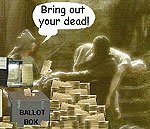 Diven, who switched from being a Democrat to a Republican last year, blamed a lazy campaign worker and an out-of-date mailing list from the House Republican Caucus for the mistakes and quit the primary race. He did not, however, rule out a run in the general election as a write-in or an independent candidate.
Diven, who switched from being a Democrat to a Republican last year, blamed a lazy campaign worker and an out-of-date mailing list from the House Republican Caucus for the mistakes and quit the primary race. He did not, however, rule out a run in the general election as a write-in or an independent candidate.Diven apologized in person to Bradley's widow last Sunday. However, an assistant county solicitor told elections boss Mark Wolosik that the matter should be referred to police for an investigation.
TODAY'S MAIN ISSUE: CAMPAIGN FINANCE REFORM
 |
| 
Friday, May 12, 2006
What did $125 million in Pa. lobbying buy last year?
RANTER'S NOTE: Tuesday is election day in Pennsylvania. To better prepare you for pushing the electronic buttons in a new-fangled voting booth, I've decided to look at an issue each day that you might want to factor into your decisions.
 No one really knows for sure how much lobbyists spend annually to wine, dine, entertain, fly, house or otherwise influence Pennsylvania's Legislature or which lawmakers have benefited the most.
No one really knows for sure how much lobbyists spend annually to wine, dine, entertain, fly, house or otherwise influence Pennsylvania's Legislature or which lawmakers have benefited the most.The best guess for now is that 800 registered lobbyists spent nearly $125 million last year to sway the opinion of our 253 elected lawmakers as well as high-ranking officials in Gov. Ed Rendell's administration, according to statistics the lobbyists filed with the Secretary of the Senate.
And we only know that because since 2003, state Senate rules have required "lobbyists, at their discretion, to report all expenses - that is, money spent lobbying the Senate, House and executive branch - rather than breaking out Senate lobbying only."
There are currently no bills pending in either the House or the Senate to set limits on that lobbying.
Of the $125 million spent to lobby state leaders last year, only $3.4 million was reportedly spent directly on "gift(s), entertainment, meal(s), transporation or lodging."
No one really knows if that's true, though. The lobbyists are not required to report specifically what they bought or who they bought it for.
Elected and appointed officials are required by the state Ethics Law to detail such gifts in their annual statements of financial interests if more than $250 was spent.
However, the state Ethics Commission doesn't check those statements for completeness or accuracy, and only investigates after it receives a formal complaint.
Statements for most elected officials are available on the commission's Web site. But the statements of most appointed officials and executive branch employees stay within their department and must be requested in person.
The Senate's lobbyist disclosure rules may sound lax, but believe it or not, they are actually the toughest in Pennsylvania.
That's because the House of Representatives doesn't have any - making it the only state governing body in the nation not to have some form of lobbyist disclosure.
In March, Gov. Ed Rendell imposed looser rules than those of the Senate on executive branch lobbyists, saying he got tired of waiting for the House to pass a lobbyist disclosure law that covered both it and the executive branch.
"We've waited so long and nothing happened," Rendell said.
The House passed a lobbyist disclosure law for it and the executive branch in 1998. But it was struck down in 2002 by the state Supreme Court because it imposed rules on lawyers who work as lobbyists. Under the state Constitution, lawyers only answer to the Supreme Court.
Since then, Speaker of the House John Perzel has resisted repeated calls for a lobbying disclosure bill, including a petition signed by 46 state representatives just last week.
 Although one such bill (H.B. 700) does exist, Perzel is not a co-sponsor of it and said in February he would only bring a bill to the floor if he could write it in secret.
Although one such bill (H.B. 700) does exist, Perzel is not a co-sponsor of it and said in February he would only bring a bill to the floor if he could write it in secret.He's doing just that, or I should say his unnamed "research staff" are writing it for him. Meanwhile, Perzel has put together a panel of current and former state lawmakers, lawyers, judges and others to make sure the bill passes Constitutional muster before it's put to a vote.
Minutes from the panel's secret teleconferences say lobbyists will only have to disclose the total amount of money they spend and name their client. They won't have to say which bill they were lobbying for or against, or list who got what.
Yet, Perzel still touts his bill as lobbying "reform" on his Web site and and issued a press release today saying he hoped to have it on Rendell's desk by the end of June.
"My goal for this legislation is to have a law that will lead to more openness and transparency in our state government and to produce a product the people of Pennsylvania will be proud of," the press release quotes Perzel as saying.
His statement was released in time to respond to a vocal protest held by six public interest groups outside the Capitol on Friday.
Perzel's own statement of financial interest for last year says he accepted $34,316 in gifts, trips and cash from various sources. It does not specify the names of the lobbyists who gave it all to him, merely the original sources of the money.
Of the $125 million estimated cost of lobbying last year, nearly half - $58.3 million - was paid just by health care companies and construction/manufacturing interests.
Another $4.5 million was spent by gambling companies.
Although the state law legalizing slot machines prohibited direct contributions to political candidates by anyone interested in opening a slots parlor or providing the machines, it set no limits on lobbying.
Perhaps state Rep. Greg Vitali, who has long championed true lobbying reform, said it best in a Feb. 28 letter to the editor he sent to most newspapers in the state.
"The problem is that we don't know how much is being spent on which legislators by what lobbyists to advance what particular bills," Vitali, D-Delaware County, wrote. "If constituents were able to compare their own legislator's voting record to the gifts they received from lobbyists, it would curtail this type of improper influence peddling."
 Vitali also noted, "A watered-down bill or another committee to study the issue is not enough. If the public does not get this legislation by May 16, they have an easy way to register their dissatisfaction with their legislator on that day - right after the curtain closes."
Vitali also noted, "A watered-down bill or another committee to study the issue is not enough. If the public does not get this legislation by May 16, they have an easy way to register their dissatisfaction with their legislator on that day - right after the curtain closes."YESTERDAY'S ISSUE: THE PAY RAISE
 |
| 
Thursday, May 11, 2006
Legislative pay raise pissed off Pa.
 TODAY'S ISSUE: THE PAY RAISE. Some say it may be the major issue driving voters to the polls this year and could even effect Gov. Ed Rendell's bid for reelection.
TODAY'S ISSUE: THE PAY RAISE. Some say it may be the major issue driving voters to the polls this year and could even effect Gov. Ed Rendell's bid for reelection.Without any public debate, Pennsylvania legislators passed House Bill 1521 in the early morning hours of July 7, 2005. That bill raised their pay by at least 16 percent from $69,647 to a base salary of $81,050 - more than any other state except California. Here's a complete list of who voted for it.
Under the bill, committee chairmen were to receive a 29 percent boost to $89,155, while the top two leaders would make $145,553. The measure also increased pay to all state judges from 11 percent to 15 percent and hiked the salaries of all of the state's top executive branch officials, including the governor, lieutenant governant and cabinet secretaries.
Rendell signed the bill into law the next day, saying, "This legislation, particularly the concept of linking state salaries to a percentage of those paid equivalent federal officials, emanated from an idea put forth by our fine Supreme Court Chief Justice Ralph Cappy. It was a very good suggestion."
Anticipating some voter opposition, many lawmakers said they deserved the raise, claiming it was their first since 1996. However, they actually received cost-of-living increases that pushed their salaries from $55,800 in 1996 to $72,187 this year.
It took four months of voter outrage and the historical ouster of state Supreme Court justice Russell Nigro, but the Pennsylvania Legislature repealed the pay raise on Nov. 16.
All but one lawmaker, state Rep. Michael Veon, D-Beaver County, voted for the repeal.
Yet, despite a state Constitutional provision prohibiting it, legislative leaders let lawmakers take the pay raise in advance in the form of "unvouchered expenses" and never required them to pay the money back after the repeal.
At least 14 state senators and 99 representatives took the money. House Speaker John Perzel refused to name them. Months passed. Some paid the money back. Some did not.
No one ever got a complete list of who didn't return the cash, but Pa. Clean Sweep, one of many grassroots political groups to form in opposition to the pay raise, managed to piece together a list it calls the "The Hall of Shame."
Perzel and Veon are still on it, as are House Minority Leader H. William DeWeese, who initially voted against the repeal then caved in on the second vote, and House Majority Leader Sam Smith.
Senate President Pro Tempore Robert Jubelirer is not. Although he originally championed the pay raise, his change of heart about the unvouchered expenses led, at least in part, to the full repeal. He paid his money back and wrote a written apology to his constituents. Senate Majority Leader David "Chip" Brightbill is also listed as paying the money back.
The pay raise has been the subject of two lawsuits. One filed by taxpayer and lieutenant gubenatorial candidate Gene Stilp went to the state Supreme Court and was denied.
That didn't end the controversy, however.
The other lawsuit, filed by good government group Common Cause, was filed in federal court after two state judges filed their own lawsuits and demanded their raises be restored. The state Supreme Court agreed to hear their cases even though Common Cause is seeking an injuction, claiming a conflict of interest and alleging Cappy traded the justices' approval on other matters pending before the Legislature in exchange for the pay raise.
Meanwhile, incumbent lawmakers now find themselves facing primary opponents, some for the first time in decades.
One of them is state Rep. Kenneth Ruffing, D-Allegheny County, whose name still appears on PACleanSweep's Hall of Shame list.
Ruffin told the Pittsburgh Tribune-Review this week that he did not return his $4,000 in illegal extra pay back to the state. Instead, the four-term representative from West Mifflin, who faces two challengers in Tuesday's primary, claimed he donated the money to an autism charity.
Ruffing said he made the donation because one of his sons is autistic. He promised to provide documentation on the donation after the primary, but declined to say why he couldn't do so before other than to say, "They want to remain anonymous."
 Tim Potts, co-founder of grassroots political group Democracy Rising PA, said Ruffing's claim defies belief. "It's nuts to say, 'Here's my defense. I can't prove it.' "
Tim Potts, co-founder of grassroots political group Democracy Rising PA, said Ruffing's claim defies belief. "It's nuts to say, 'Here's my defense. I can't prove it.' "C.L. "Jay" Jabbour, a former Allegheny County and West Mifflin councilman who opposes Ruffing in the primary, said, "No one from the Autism Society, or other autism-related charities and organizations we contacted, ever heard of Ken Ruffing."
 |
| 
Wednesday, May 10, 2006
Would it be too much trouble
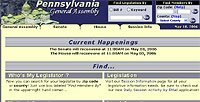 Unless you've been living under a rock since 1990, you know we now live in a digital age.
Unless you've been living under a rock since 1990, you know we now live in a digital age.More and more people are getting their news from the Internet, not just reading newspapers online, but doing legitimate research by going to many of the same sources and government Web sites as reporters.
Our government and newspapers should be encouraging that. It's a boon to Democracy and a chance for our leaders to speak directly to an informed constituency without the filter of a reporter and editors.
But they aren't.
Instead, the Pennsylvania's Legislature's Web site seems mired in the late 1990s by comparison to the New Jersey Assembly's more modern and easier to use site.
And newspapers freely cite facts from state reports they glean online, but don't enable readers to look up the information for themselves.
Meanwhile, with just two clicks, New Jersey citizens can see a list of the latest bills being introduced into that state's Assembly, a brief synopsis of the bill and a link to its full text.
And with just a few more intuitive clicks, New Jersey's Web site also lets users sort the bills by their author. What a great tool for lighting a fire under the back benchers who are only in the Capitol to collect a salary, a per-diem and a free car!
Pennsylvania's Web site doesn't offer either function.
Instead, it relies on its users knowing either a bill's number or the original topic of the bill. Sometimes even that doesn't help.
It didn't in 2004, when the state's top lawmakers slipped the 146-page bill to legalize slot machines into an unrelated two-paragraph measure about background checks for harness racing track employees, then brought the bill to the floor for a vote without any public debate before the July 4 adjournment.
To this day, anyone interested in finding the slots bill (S.B. 292 of 2004) cannot find it directly under the keyword "SLOTS." Instead, a message there refers you to either "GAMBLING AND GAMBLERS" or "HORSE RACING." The slots bill is buried deep in both topics amid a long alphabetical list of other unrelated bills.
Neither state's Web site is set up to be spidered by Google or Yahoo. Would it be too much trouble to give your constituents the ability to find information by using the leading search engines?
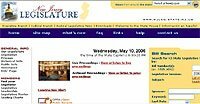 Both New Jersey's and Pennsylvania's Web sites do let users subscribe to an e-mail service that tracks changes and updates to specific bills and delivers them to those interested - after the fact.
Both New Jersey's and Pennsylvania's Web sites do let users subscribe to an e-mail service that tracks changes and updates to specific bills and delivers them to those interested - after the fact.Would it be too much trouble to set up a live XML or RSS feed of all the bills that's updated as they're being worked on in committee, caucus and on the floor so that there's still time for voters to give input to their elected leaders?
The Pennsylvania site's only true innovation is a nightly e-mail subscription that lets voters receive a daily roundup of what bills were passed, voted down or introduced. But even that has its problems.
For instance, instead of one e-mail I actually get two identical e-mails - even when the Legislature isn't in session. I've tried unsubscribing and re-doing it. Same problem.
The e-mail itself is pretty vague. All it gives you is a lengthy list of bill numbers, what action was done to each, a link to each bill's history and another link that takes you to a page from where you can click another link to find its full text.
Would it be too much trouble to include the synopsis contained at the top of each bill in the e-mail so recipients would not have to click on every one of them and then onto another page to figure out what each bill is about?
Newspaper reporters and editors aren't helping the cause. They are doing their readers a giant disservice by failing to recognize this tectonic shift in how people now get their news and information.
Would it be too much trouble to actually include Web addresses (even lengthy ones) into news stories - and in the case of online newspapers, direct hyperlinks - when a reporter writes about a specific bill or a politician's campaign finance report? That way, readers could go directly there to read more and not have to play detective.
Case in point, the Harrisburg Patriot-News published a great article today, "Big Spenders," about the large advantage in campaign contributions several legislative leaders have over their primary opponents - despite the outrage over last year's now-repealed pay raise.
"Senate President Pro Tempore Robert Jubelirer, R-Blair, has raised nearly $7 for every dollar thrown into the war chest of his most serious primary opponent, Blair County Commissioner John Eichelberger. Jubelirer has raised $1.3 million to Eichelberger's $191,720. Reports for Jubelirer's other primary challenger, C. Arnold McClure, were not available yesterday."
Would it have been too much trouble to hyperlink those dollar amounts to the reports the state Department of State posts online so readers could see who gave that money? Or at the very least, give people the Web address for the online campaign finance database so they could look it up for themselves?
One final note. After spending an entire weekend reviewing the latest statement of financial interests for some of the same lawmakers the Patriot-News looked at, I have a suggestion for the state Ethics Commission.
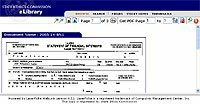 Would it be too much trouble to make sure the pdf files they create with these important public disclosures are not just images inside a pdf, but an actual document. That way, it could be searched and information could be copied from it. No one can do that now.
Would it be too much trouble to make sure the pdf files they create with these important public disclosures are not just images inside a pdf, but an actual document. That way, it could be searched and information could be copied from it. No one can do that now.As for the Ethics Commission's Web site, its failures are so large they account for four of my "Top 10 ways to fix Pa. today."
As news holes in newspapers continue to shrink to save money, both the Pennsylvania Legislature and the New Jersey Assembly offer e-mail subscription services to keep constituents up to date on bills. The e-mails arrive at night after it's too late for public input, but at least it's something.
 |
| 
Tuesday, May 09, 2006
Is New Jersey going to pot?
 Ed Forchion would have loved today's news that New Jersey will consider becoming the 12th state to legalize marijuana as "compassionate" prescription medicine for some patients.
Ed Forchion would have loved today's news that New Jersey will consider becoming the 12th state to legalize marijuana as "compassionate" prescription medicine for some patients.The longtime pot-legalization advocate, former gubernatorial candidate and resident pain in politicians' and policemen's patoots once legally tried to change his name to NJweedman.com.
Forchion was arrested for lighting up joints in protest at the statehouse in Trenton and near the Liberty Bell in Philly. He received 9,075 votes in last year's gubernatorial primary, putting him in fifth place out of 11 Democratic candidates.
I'm sure Forchion would have probably felt vindicated if he had not moved from Brownsville to Los Angeles, Calif., this year to take a job with a medical marijuana dispensary.
State Sen. Joseph Vitale, chairman of a Senate health panel, told the Associated Press today he scheduled a June 8 discussion to hear from experts on a pot for patients bill (S.B. 88) proposed by Sen. Nicholas Scutari. Vitale said he supports the concept, but has questions.
"As a prosecutor, I see the detrimental effects of recreational marijuana; however, marijuana has been shown in many cases to give people with debilitating medical conditions a chance to lead normal lives," Scutari, D-Middlesex, Somerset and Union, said in a press release when he introduced the bill in January. "As a lawmaker, I want to see seriously ill people given every option for treatment and pain relief."
 Scutari, a former Union County freeholder, was elected to the Senate in 2003 after Sen. Joseph Suliga announced he would not seek reelection. The Republican incumbent's decision came after he was arrested in Atlantic City for drunkenly telling a woman in the Trump Marina casino, "I want to suck your toes and work (my) way all the way up...." Suliga was killed in a bizarre accident last year while in the backseat of a car parked at a Linden go-go bar.
Scutari, a former Union County freeholder, was elected to the Senate in 2003 after Sen. Joseph Suliga announced he would not seek reelection. The Republican incumbent's decision came after he was arrested in Atlantic City for drunkenly telling a woman in the Trump Marina casino, "I want to suck your toes and work (my) way all the way up...." Suliga was killed in a bizarre accident last year while in the backseat of a car parked at a Linden go-go bar.The freshman senator's proposal, based on the 1999 findings of the Institute of Medicine at the National Academy of Sciences, would limit possession of marijuana to six plants or one ounce per patient suffering from a chronic or debilitating disease/medical condition, including: wasting syndrome, epilepsy, AIDS, multiple sclerosis, Crohn's disease, severe or chronic pain, nausea, seizures or muscle spasms.
Scutari's measure flies in the face of a June 2005 U.S. Supreme Court ruling that the federal government can prosecute people who use marijuana no matter what a state law says. To me, it's just another sign that the war on drugs is over and drugs won.
If you think the state Assembly is just paying lipservice to the pot issue consider this: During last year's gubernatorial campaign, Gov. Jon Corzine promised to sign a medical-marijuana law if one makes it to his desk.
"I believe medical marijuana is something that, if a doctor prescribes it, we need to do what is in the best interest of the patient," Corzine said during an Oct. 11 radio debate with Doug Forrester. "It's a tragedy when you're not giving the best medication to an individual."
 If I were Corzine and facing a potential $5 billion budget deficit next year that's forcing him to cut funding to the state's poorest schools and to tax hospital beds, I'd seriously consider decriminalizing pot in New Jersey for adults, treating it like alcohol and taxing the heck out of it.
If I were Corzine and facing a potential $5 billion budget deficit next year that's forcing him to cut funding to the state's poorest schools and to tax hospital beds, I'd seriously consider decriminalizing pot in New Jersey for adults, treating it like alcohol and taxing the heck out of it.It would bookend nicely with the indoor tobacco smoking ban his predecessor, Gov. Richard Codey, passed before leaving office and which became law last month. It might also provide more inspiration for a new state slogan.
Don't look for a similar medical marijuna measure in Pennsylvania any time soon. The only pot proposal pending in the Legislature (H.B. 2034) would prohibit the sale of marijuana or hemp flavored candy.
That bill, introduced last year by state Rep. Thomas Corrigan, D-Bucks County, was in reaction to the sale of "Stoner Pops" at Spencer Gifts and other novelty shops.
 One final note, after intense pressure from the U.S., Mexican President Vicente Fox last week asked that country's Congress to reconsider a law it passed that would decriminalize the possession of small amounts of drugs.
One final note, after intense pressure from the U.S., Mexican President Vicente Fox last week asked that country's Congress to reconsider a law it passed that would decriminalize the possession of small amounts of drugs.Fox had previously vowed to sign the law in order to free police up for other duties, such as pursuing large-scale drug dealers.
 |
| 
Monday, May 08, 2006
Rethinking Jubelirer
 I don't live in his Pennsylvania senatorial district and I'm not even a member of his party, but two newspaper stories this morning got me wondering if I've been too hard on state Senate President Pro Tempore Robert Jubelirer.
I don't live in his Pennsylvania senatorial district and I'm not even a member of his party, but two newspaper stories this morning got me wondering if I've been too hard on state Senate President Pro Tempore Robert Jubelirer.At least, about Jubelirer's "quarterbacking" last year's now-repealed legislative pay raise into law. The eight-term Republican's reversal and subsequent written apology to his constituents made statewide news last year.
I'm still plenty pissed at him, though, for saying he was against legalizing slot machine parlors and then taking campaign money from licensee hopeful Louis DeNaples. But that's another story.
Bob is weaving but still catching the most flack from his constituents about the pay raise.
Jubelierer's initial support of the pay raise was "part of the trappings of being in power," Dennis Brown, 67, of Roaring Spring told the Associated Press over the weekend. Brown is now supporting a Jubelirer primary challenger, John Eichelberger.
That's because Brown probably missed a Nov. 20, 2005, story in the Pittsburgh Tribune-Review which credits Jubelirer's change of heart with crashing down the house of cards the pay raise was built upon.
As the story goes, Jubelirer, R-Altoona, walked into the office of Senate Minority Leader Robert Mellow at 4 p.m. on Monday, Oct. 31, and told him, "I have bad news for you. ... I'm sorry, I've changed my mind"
Jubelirer wanted to get rid of the unvouchered expenses portion of the pay raise, a legal trick that let incumbents take the raise early despite a provision in the state Constitution that's supposed to prevent it.
"The fact is, we were getting nothing done," Jubelirer told the Trib. "It dominated everything. And I felt the time had come to absolutely listen to the public out there. I did what I thought was right."
Mellow said, "I never saw it coming." Neither did House Minority Leader H. William DeWeese, who later asked Jubelirer, "How can you do this unilaterally? There were four caucuses, the governor and the (state) Supreme Court" involved in passing the pay raise, DeWeese said.
DeWeese's statement alone proves the point of Common Cause's federal lawsuit, which alleges collusion and favorable rulings between the state's highest court and lawmakers in exchange for a pay raise that would also cover the courts and the executive branch.
Jubelirer's decision led to a Nov. 1 secret meeting in Jubelirer's office attended by all of the state's top lawmakers. "Jubelirer seemed to be beset by an extravagant case of the jitters," DeWeese recalled. "It became clear to all of us within about 30 seconds of entering the room that Robert Jubelirer was morphing into John Hancock trying to erase his name from the Declaration of Independence."
But it wasn't Jubelirer's courage that brought the full repeal to a floor vote. Sensing weakness, Sen. Jim Ferlo, D-Highland Park, and Sen. Sean Logan, D-Monroeville, cut a deal with staffers of Lt. Gov. Catherine Baker Knoll to make sure their bill for a full repeal made it to the floor before leaders could bring a bill outlawing only the unvouchered expenses.
Jubelirer tried to talk Logan out of it, but in the end accepted most of the blame and rebuke - not credit - by his peers for the full repeal.
Instead of being hailed as a hero of taxpayers, House Majority Leader Sam Smith accused Jubelirer of secretly trying to keep the judges' pay increase because his wife, Commonwealth Court Judge Renee Cohn Jubelirer, was in line for a hefty salary hike.
"I'm convinced that he doesn't have more than half a dozen people out of 253 (members of the Legislature) that have a shred of respect for his commitment to the institution of the General Assembly," DeWeese told the Tribune-Review.
He also called Jubelirer's decision an act of "epic cowardice," and added, "We'll certainly never name a building after him."
This from a guy who supported the pay raise until the second vote came for its repeal, leaving House Minority Whip Mike Veon hanging in the wind as the lone dissenting lawmaker.
There's one thing I hate more than unrestrained greed, and that's a mean-spirited schoolyard bully who lacks the courage of his convictions.
 Anybody who has ever read about the Milgram experiment knows that peer pressure can be a powerful force. The social psychology experiment found just 35 percent of those tested refused to administer a lethal shock to another person despite orders from an authority figure.
Anybody who has ever read about the Milgram experiment knows that peer pressure can be a powerful force. The social psychology experiment found just 35 percent of those tested refused to administer a lethal shock to another person despite orders from an authority figure.For his willingness to stand up to such scorn and do what's right, whether he believed in it or not, voters in the 30th-district, which includes Blair, Bedford, Huntingdon and parts of Fulton counties, should seriously consider sending Jubelirer back to the Senate next Tuesday.
Plus, it would really piss off the powers that be in Harrisburg and that - even more than Jubelirer's past accomplishments in office or his endorsement by Republican gubernatorial candidate Lynn Swann - might be the reason to return him there.
Labels: Bob Jubelirer, casino, Ed Rendell, Louis DeNaples, slots
 |
| 
Sunday, May 07, 2006
No gifts? Not so fast Eddie
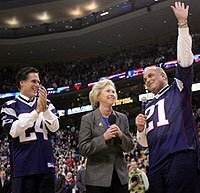 There were no real surprises in Pennsylvania Gov. Ed Rendell's annual statement of financial interest this year - assuming, of course, you believe his ludicrous claim that he accepted no gifts valued at more than $250 last year.
There were no real surprises in Pennsylvania Gov. Ed Rendell's annual statement of financial interest this year - assuming, of course, you believe his ludicrous claim that he accepted no gifts valued at more than $250 last year.Rendell also reported only one trip paid for by an outside group. Its $830 bill was covered by the Democratic Governors Association, for which Rendell serves as finance chairman. His state form does not specify the trip's date or where he went.
But the governor was reportedly in Las Vegas on April 26, 2005 soliciting donations from gambling executives to the association. The association has since contributed $300,000 to Rendell's reelection campaign.
The move is slimey, to be sure, but there's no law against it. The 2004 state law legalizing slot machines prohibits direct campaign contributions by companies that want to operate a slots parlor or supply machines, not contributions passed indirectly through outside groups. Lobbying by gambling interests is also legal.
It's the little things Fast Eddie should now be most worried about.
I find it hard to believe that nobody - from a local 4-H club to the hordes of lobbyists roaming the halls in Harrisburg - gave even a single pricey present to the incumbent governor, former Democratic National Committee chairman, two-term Philly mayor and district attorney.
That would include his courtside ticket to the Sixers-Celtics game in Boston on April 3, 2005, where Rendell paid off his highly publicized Super Bowl bet with Massachusetts Gov. Mitt Romney by singing the national anthem.
I seem to remember a hastily issued press release saying Rendell paid for the trip himself. But what about the ticket, or the tickets to other sporting events Rendell attends, aside from Eagles home games for whom he owns season tickets?
The form each state employee, candidate and elected and appointed official in Pennsylvania is required to fill out annually asks that person to "provide the name and address of the source and the circumstances and value of any gift(s) received valued at $250 or more."
That does not include campaign contributions or gifts from "friends or family," but does require gifts from lobbyists to be listed.
By signing the form, each public servant is saying the information is true and correct under Pennsylvania's Unsworn falsification to authorities law and the state Ethics law. Violations of either are misdemeanors punishable by up to a year in jail or a $1,000 fine.
If that's a game-worn jersey he wore in the photograph above, it would almost certainly have to be declared. Or maybe Romney and Rendell are "friends" by virtue of holding the same job in different states.
So did Rendell break the law?
It's tough to say. First you would have to prove the governor accepted a gift worth more than $250 - say a courtside or front row ticket - from somebody who isn't a friend. Then you would have to file a complaint form with the state Ethics Commission, who would investigate the allegation even though the commission actually reports to the governor.
I will say this, Rendell was so concerned that lobbyists were wineing and dining the executive branch on his watch, that he issued an executive order in March requiring lobbyists to register their activity.
However, his order carried no penalties for violations, nor did it require the lobbyists to list how much was given to individual public servants - just the total cost for gifts, entertainment, meals, transportation, lodging and receptions.
Also, lobbyists only had to register if they spent more than $2,500 per quarter in the previous two years.
Why doesn't the law require the officials being lobbied to report the gift?
A press release from Rendell says the Governor's Code of Conduct already requires many state officials and employees of the Executive Branch to file statements of financial interest, where they have to list their personal economic interests, business interests and gifts in excess of $100.
However, most of those forms stay within the department employing the person and are not posted online for the public to read.
Nevertheless, Rendell used the opportunity to bash the Republican leadership of the state House of Representatives for failing to pass a lobbyist disclosure law covering both it and the executive branch. "We've waited so long and nothing happened," he said.
House Speaker John Perzel and his crack unnamed "research staff" are working on a bill now behind closed doors.
Rendell isn't exactly hurting for cash, according to stories about the income tax return he released to reporters last month. In addition to his $145,000 gubernatorial salary, he moonlighted as both a paid lecturer at the University of Pennsylvania for $20,000 and made $15,000 as an Eagles commentator for Comcast SportsNet.
Pennsylvania First Lady Midge Rendell also draws a $157,734 salary as a U.S. Circuit Court judge, the Associated Press reports. Together, the Rendells' income hit $618,560 last year when their profit from selling shares of stock are added in.
The Rendells are clearly not as rich as New Jersey Gov. Jon Corzine or even Ed's likely Republican opponent this fall, Lynn Swann.
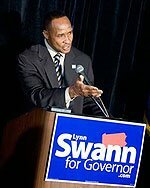 Swann released his income tax return to reporters this week and it shows his income last year to be over $1 million, including the $558,964 he earned as an ABC sportscaster, public speaker, and by sales of merchandise signed by the football Hall of Famer, the Associated Press and Inquirer reported.
Swann released his income tax return to reporters this week and it shows his income last year to be over $1 million, including the $558,964 he earned as an ABC sportscaster, public speaker, and by sales of merchandise signed by the football Hall of Famer, the Associated Press and Inquirer reported.The rest of his money came from investments and his position as a board director for food giant HJ Heinz Co., Hershey Entertainment and three other companies.
Swann's statement of financial interests offered few more details, other than he too has not received any gifts or had any travel paid for by another person.
His merchandising company, Swann Inc., started paying 6 percent state sales tax last month on its Web site sales last month after Allentown Morning Call reporter John Micek questioned the state Department of Revenue whether he was paying it.
Below are the latest statements of financial interests filed with the State Ethics Commission by Gov. Ed Rendell and Republican gubernatorial candidate Lynn Swann.
In order to read them, you must have Adobe's pdf reader installed in your browser. To down a free copy, click here or on the icon below:
 Gov. Ed Rendell
Gov. Ed Rendell Lynn Swann
Lynn Swann
 |
| 
Newsflash: Casey has an interest-bearing checking account
 The annual statement of financial interest filed by Pennsylvania Treasurer and U.S. Senate candidate Bob Casey Jr. is a lot like the guy himself.
The annual statement of financial interest filed by Pennsylvania Treasurer and U.S. Senate candidate Bob Casey Jr. is a lot like the guy himself.It's strictly a no-frills exercise, filled with incredibly detailed information and with little by way of a smoking gun.
The Scranton Democrat went well above and beyond what was required by the form or the state ethics law, spelling out every state board and committee he's ever been on since he was first elected the state's Auditor General in 1996.
He even went so far as to list his interest-bearing checking account at First National Community Bank in Dunmore as one of the sources of his income.
He did take one trip, though, paid for by an outside organization.
Casey and his wife, Terese, took an "official trip" to Israel in his capacity as state treasurer between Nov. 17 and Nov. 23, 2005. The $11,446 trip was paid for by the National Jewish Democratic Council.
 His opponent this fall will be incumbent U.S. Sen. Rick Santorum, who was not required to file a statement of financial interest under Pennsylvania law.
His opponent this fall will be incumbent U.S. Sen. Rick Santorum, who was not required to file a statement of financial interest under Pennsylvania law.He did have to file a similar statement with the Secretary of the Senate's
Office of Public Records. But neither it nor the Senate Ethics Committee make the completed forms available online.
Santorum's personal finances have been documented by reporters and his home mortagage was also the subject of an investigation recently by Will Bunch of the Philadelphia Daily News.
 State Treasurer Bob Casey Jr.
State Treasurer Bob Casey Jr.
 |
| 
This Week's Rants | The Daily Rant Archives

This work is licensed under a Creative Commons Attribution 2.5 License.

This work is licensed under a Creative Commons Attribution 2.5 License.


